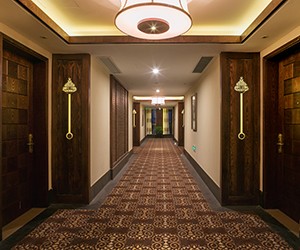It hasn't been all that long ago that an association planner could guarantee her convention hotel room block with some confidence. Armed with a meetings history, she could predict how many people would arrive for the pre-conference golf event and stay through the closing party. She would also know many would attend only the core meeting. Guaranteeing a hotel block of guest and meeting rooms, plus F&B expenditures, was fairly routine.
But today's attendees aren't so predictable, and they are handing planners significant contract negotiating challenges. This is a problem especially for association planners. While corporate attendees may have built-in job advancement and security reasons for hanging before, during and after a conference, attendees at association and other types of events usually do not.
"We have a demographic shift from 10 or even five years ago," says MaryAnne Bobrow, president of Bobrow & Associates, whose clients include many state and national associations that sometimes book annual meetings five to 10 years out. It used to be you really had to stay for the closing party to network. But now people look at what it costs to stay maybe a third or fourth hotel night and they cut back on their time with you. Also, younger people just don't care about staying around."
These behaviors make contract negotiations tentative. Some planners are reluctant to guarantee sleep and meeting spaces or F&B, and this can affect rates and availability.
What's Going On?
Many attendees of any age feel time-impoverished or they want to save money on hotel stays. Their interests in the agenda may be minimal. They choose to be on the scene for the educational or speaker segments that interest them, and off they go.
Millennials (people born between 1980 and 2000) are especially unpredictable, say planners who try to understand them. They may locate a hotel down the street from the one you contracted that they consider more hip and pleasing, and via social media, marshal a group of other attendees to take with them, leaving you a gaping hole in your room block.
"People will often check the boxes telling you they will attend everything but then they don't show up," Bobrow says. "Maybe they get a better offer, or it's their first time in a city and they want to look around. They don't want to get trapped at what they consider a boring party, and you end up with fewer people at an event that carries F&B obligations. Many prefer business networking via online platforms rather than in-person receptions and other events. They don't know or think about how their behavior impacts the organization."
Kristine Van Winkle, CMP, CASE, CTE , Marriott International’s senior association account executive, agrees with Bobrow.
"Older and 'tried and true' attendees will go where the association books a conference because they understand how what they do affects the organization," she says. "But youngers are different. Their behaviors affect room blocks and attrition but they don't care. They are adventurers and they want to hike and bike, not stand around a hotel meeting room with a glass."
Contract Strategies
So how does a planner cope with these behavior changes?
Van Winkle said planners must be in tune more than ever before with the demographics and preferences of all their attendee constituents, so they can plan and market content that keeps them on the meetings scene.
"I believe the post-meeting surveys need to have more specific questions other than “Did you like the hotel?” And there might need to be some incentive to get millennials to respond," Van Winkle advises. "They are actually responding in the moment at the conference and sharing with their friends—sometimes that is the only feedback a planner has—so organizers need to pay close attention to social media."
And when it comes time for contract negotiations, flexibility is the name of today's contract game, she contends. In the midst of the current sellers market and the changing behaviors of attendees, planners must be candid in conversations with hotel sales people.
"Planners are in a very challenging spot now," she says. "They used to know where and what their people were doing. But now you can't rely on actuals of two years ago, largely because of these behavior changes.
"Gone are the days when you held something in your back pocket during negotiations and pulled it out later," Van Winkle warns. "Planners need to be forthcoming about their group's needs and wants. Negotiate the needs first, then the wants."
Industry attorney Jonathan Howe, of Howe & Hutton, adds that planners must be prepared not to be surprised by surprises. And, they need to know market conditions in cities they are booking.
"In order to cope with attendance patterns they can't predict, a lot of planners are now not guaranteeing any rooms unless they have a real need for the space," Howe says. "Of course, this hinges on the destination profile and season. If you want Chicago in October you'd better have rooms blocked. In January, not so much. You gotta know the territory."
When room blocks are guaranteed in contracts, review dates need to be included, he says, so that room nights can be reduced if necessary, with the awareness that doing so can affect meeting space and F&B reservations.
"It's all a question of what drops to the bottom line," Howe says. "Also, planners need to know the words of facility sales managers are not the last. It's what the revenue manager says, because he or she looks for the most productivity."
Alliances Can Help
Pat Zollman, senior director for global accounts for Helms Briscoe, says planners can mitigate room block angst with good alliances in destinations they want to book. This entails cultivating relationships with CVBs and major hotel chains that can assist from proposal time all the way to finding out where attendees slept.
"We were trying to get numbers for a state teachers association citywide conference under control in San Jose that was attended by 3,350 people,” she says. “We had the attendee list but couldn't account for where about 1,200 people stayed. We ended up getting help from the CVB with polling all hotels in the city to learn where people had stayed. We learned that we probably could have pickup up 1,500 more rooms and the client would have had additional hotel rebate dollars to buy-down convention center space if we had known this. We estimate the association left about $30,000 on the table in this incident because they didn't know where their people were."
Learning something about that group's attendee "wandering" gave Zollman the knowledge she needed for contracting years hence.
"For next year, we had to go to hotels not in the room block and do a courtesy block of 10 rooms each in several hotels,” she says. “This means that if there is no pickup, the client doesn't pay. This kind of arrangement is sometimes harder to get, but the CVB helped us with it and it means there won't be any attrition on rooms. You are holding rooms to the cutoff of about a month to 21 days out. If the rooms get picked up you know where your people are. If the rooms don't get booked, they just go away."
Bobrow says she hasn't yet reduced a room block because of attendee behaviors, but she believes the time is rapidly coming when she and others will.
"Sometimes we just barely make our room block, while in former days we used to always oversell,” she says. “We haven't yet had a disaster, but there is a negative trend, and those who don't plan accordingly are going to get caught with penalties. Add behaviors to your risk management list."






